The Jeremy Corbyn Story: Profile of Labour leader
- Published
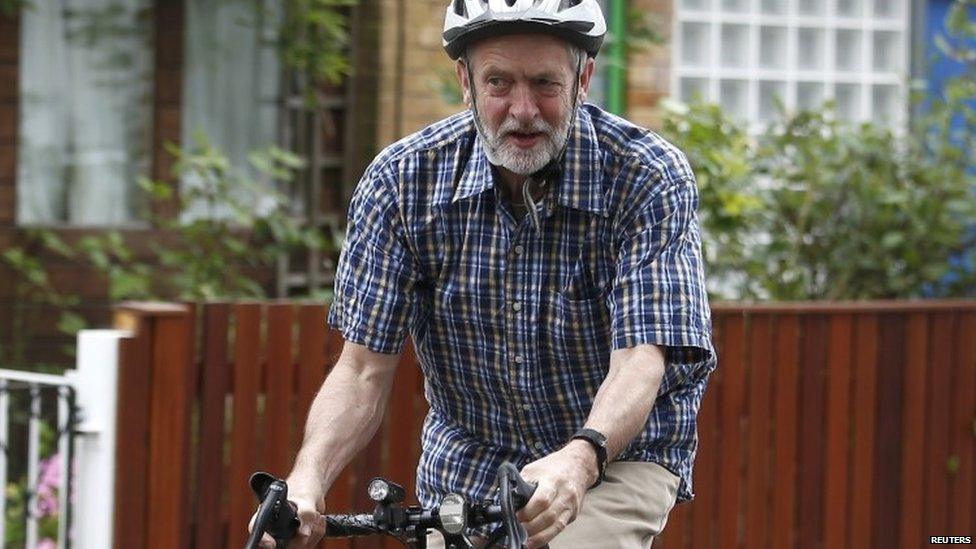
He remains in the saddle but not everyone thinks he is heading in the right direction
Jeremy Corbyn's election in September 2015 as Labour leader, at the age of 66, counted as one of the biggest upsets in British political history.
His re-election to the post almost a year later was not such a surprise but could prove even more momentous in terms of Labour's direction in the coming years and the future course of British politics.
Seeing off the challenge of Owen Smith, who had the backing of the majority of Labour MPs, has made Mr Corbyn, for the time being at least, seemingly unassailable and increased the likelihood that he will lead the opposition into the next general election - scheduled for 2020.
If that is the case, Mr Corbyn will be a highly influential figure during one of the most important political periods of the past 50 years - as the clock ticks down to the UK's exit from the EU following the Brexit referendum vote.
To his critics, he is almost a caricature of the archetypal "bearded leftie", an unelectable throwback to the dark days of the 1980s, when Labour valued ideological purity more than winning power.
But to his army of supporters he is the only honest man left in politics, someone who can inspire a new generation of activists, and make them believe that there is an alternative to the neo-liberal Thatcherite consensus that has let them down so badly.
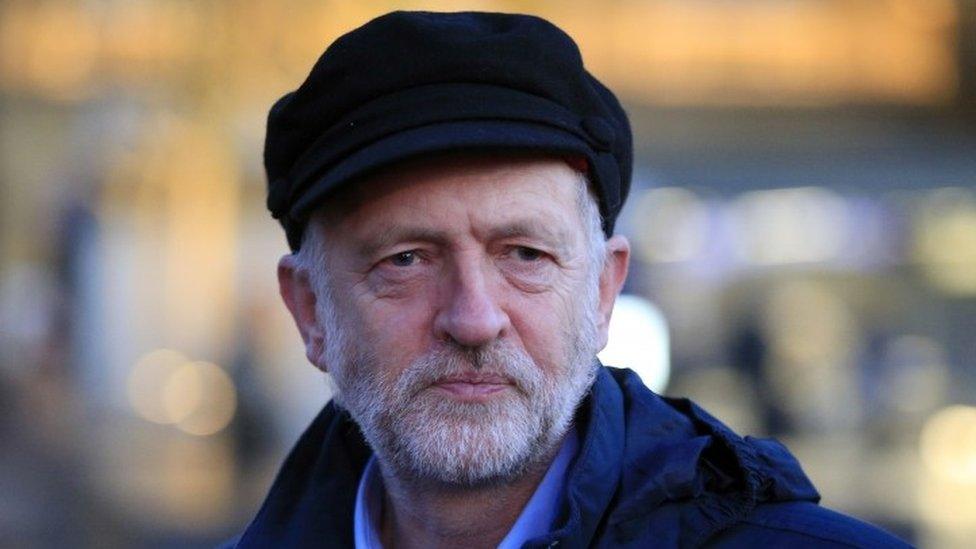
The veteran Labour politician says politics is about fighting for causes one believes in
A fixture on the British left for more than 40 years, he has been an almost ever-present figure at demos and marches, a joiner of committees, a champion of controversial causes, a tireless pamphleteer, handy with a megaphone.
But not even his most ardent admirers would have had him down as a future leader of Her Majesty's opposition. And not just because he believes in the abolition of the Monarchy.
Corbyn's brand of left-wing politics was meant to have been consigned to the dustbin of history by New Labour.
He belongs to what had been a dwindling band of MPs, which also includes Diane Abbott and John McDonnell, who held fast to their socialist principles as their party marched moved right - and into power - under Tony Blair.
'My turn'
At the start of the 2015 leadership contest, after scraping on to the ballot paper at the last minute, thanks to charity nominations from Labour MPs who wanted a token left-wing candidate to "broaden the debate", he explained to The Guardian , externalwhy he had decided to run.
"Well, Diane and John have done it before, so it was my turn."
Asked if he had taken some persuading, he replied: "Yeah. I have never held any appointed office, so in that sense it's unusual, but if I can promote some causes and debate by doing this, then good. That's why I'm doing it."
He added: "At my age I'm not likely to be a long-term contender, am I?"
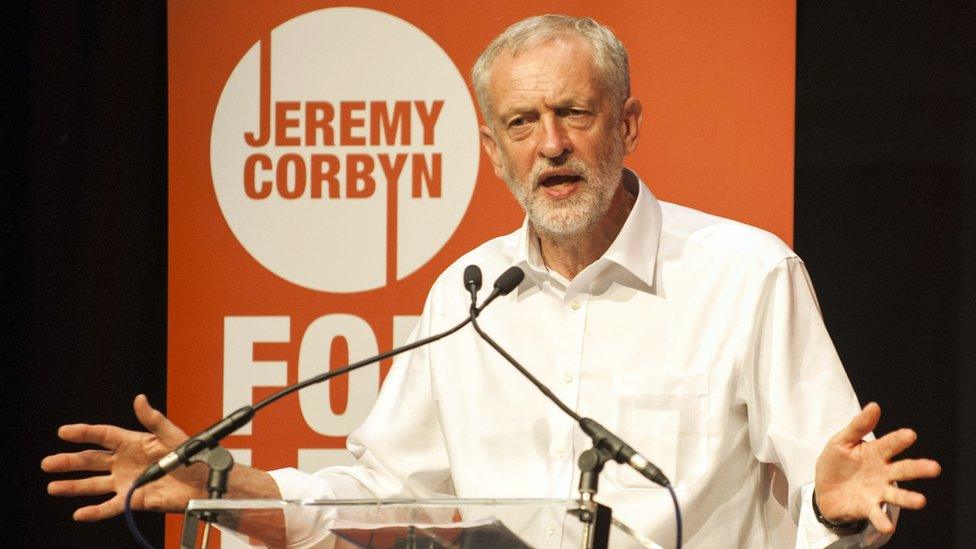
Jeremy Corbyn was greeted by rapturous crowds during his 2015 victory
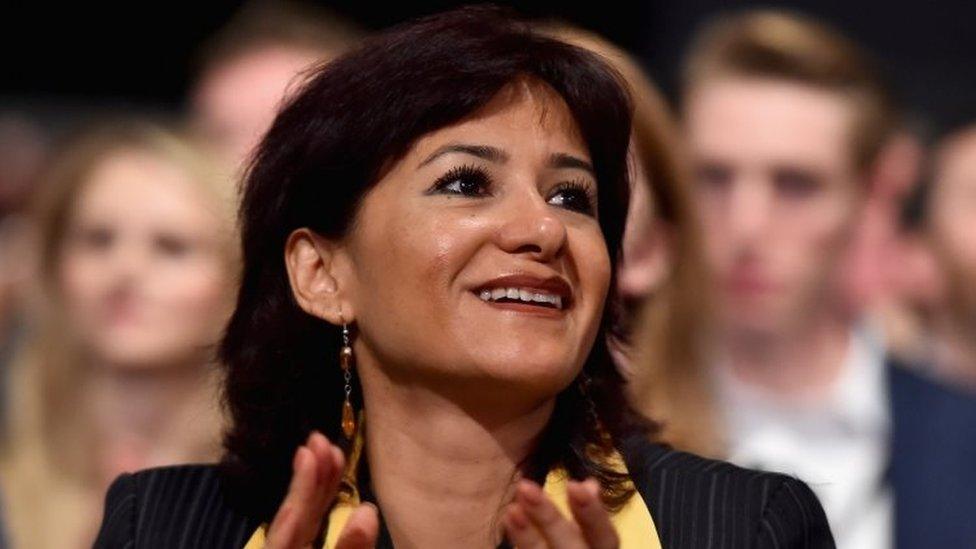
Laura Alvarez, Mr Corbyn's third wife, applauds his first victory
That view was quickly revised as Corbynmania took hold. Something about the Islington North MP struck a chord with Labour leadership voters in a way that his three younger, more polished, more careerist, rivals patently did not.
Despite, or perhaps because, of his unassuming, low-key style, he seemed able to inspire people who had lost faith in Labour during the Blair/Brown years and bring hope to young activists fired up by his anti-austerity message.
His entry into the contest also prompted a surge in people - many from the left of the existing Labour membership - joining the party or paying £3 to become registered supporters.
His perceived integrity and lifelong commitment to the socialist cause made him an attractive option to many left-wing voters jaded by the spin and soundbites of the Westminster political classes.
Over the course of a year or so since becoming leader he has become something of a cult figure - ironic for someone who always insisted he didn't do personality politics and had never tried to cultivate a following among MPs.
Legendary frugality
Instead of amusing anecdotes about youthful indiscretions, or tales of climbing Westminster's greasy pole, his political biography is dominated by the list of the causes he has championed and committees he has served on.
He once confessed he had never smoked cannabis - practically unheard of in the left-wing circles he grew up in, but the mark of a man who is known for his austere, almost ascetic, approach to life.
His frugality is legendary. He usually has the lowest expenses claims of any MP.
"Well, I don't spend a lot of money, I lead a very normal life, I ride a bicycle and I don't have a car," he told The Guardian.
Asked what his favourite biscuit was during a Mumsnet Q&A , he answered: "I'm totally anti-sugar on health grounds, so eat very few biscuits, but if forced to accept one, it's always a pleasure to have a shortbread."
Jeremy Bernard Corbyn had an impeccable middle-class upbringing.
He spent his early years in the picturesque Wiltshire village of Kington St Michael. When he was seven, the family moved to a seven-bedroomed manor house in the hamlet of Pave Lane, in Shropshire.
The youngest of four boys, he enjoyed an idyllic childhood in what he himself has called a rural "Tory shire".

Corbyn off-duty
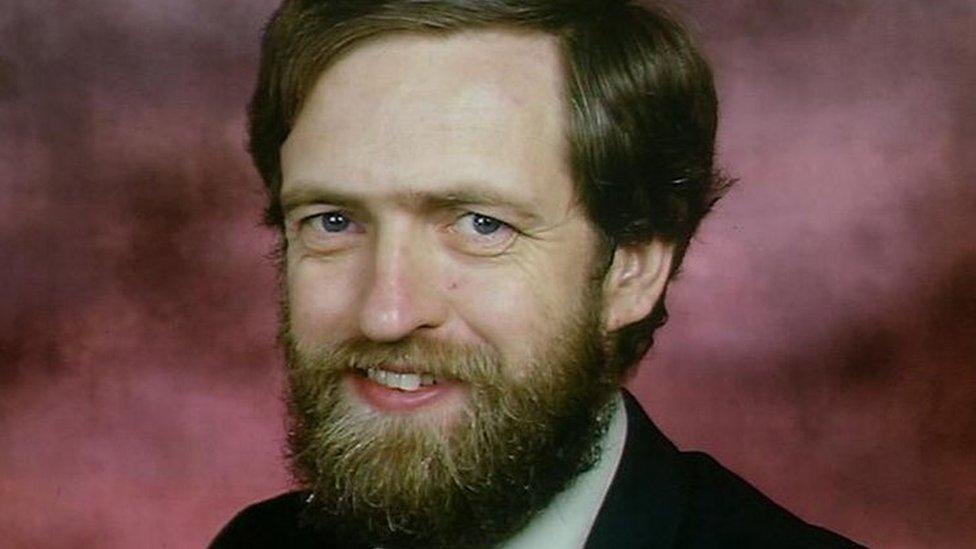
Corbyn has won Beard of the Year no less than four times
Personal life: Lives with third wife. Has three sons from earlier marriage.
Food and drink: A vegetarian who rarely drinks alcohol. According to The Guardian, his favourite restaurant is Gaby's diner in London's West End, where he likes to eat hummus after taking part in demonstrations in Trafalgar Square.
Hobbies: Running, cycling, cricket and Arsenal football club. According to the Financial Times: "He loves making jam with fruit grown on his allotment, belongs to the All Party Parliamentary Group for Cheese and is a borderline trainspotter." He does not own a car. He is known for having an unusual hobby - an interest in the history and design of manhole covers.
Culture: A lover of the works of Irish poet WB Yeats. His favourite novelist is said to be the late Nigerian writer Chinua Achebe, whose most famous work, Things Fall Apart, is about the tensions between colonialism and traditional societies. He is a fluent Spanish speaker and enjoys Latin American literature. His favourite films are said to be The Great Gatsby and Casablanca.

His brother Piers, now a meteorologist known for denying climate change is a product of human activity, has described the Corbyn boys as "country bumpkins".
Corbyn disagrees with his brother on climate change but they remain close. They both learned their politics at the family dinner table, where left-wing causes and social justice were a frequent topic of debate.
Their maths teacher mother Naomi and electrical engineer father David were peace campaigners who met at a London rally for supporters of Spain's Republicans in the fight against Franco's fascists.
Piers, who would go on to be a well-known squatters leader in 1960s London, was even further to the left than Jeremy.
Both boys joined the local Wrekin Labour Party and the Young Socialists while still at school.
Corbyn had begun his education at the fee-paying preparatory school, Castle House, in Newport, before moving into the state sector, after passing his 11-plus.
He was one of only two Labour-supporting boys at Adams Grammar School, in Newport, when his class held a mock election in 1964.
In an interview with The Sun, his friend Bob Mallett recalls Corbyn being jeered by his right-wing schoolmates: "Jeremy was the Labour candidate and I his campaign manager because at a middle-class boarding grammar school in leafy Shropshire, there weren't many socialists. We were trounced."
Corbyn left Adams with two A levels, both at grade E, and an enduring hatred of selective education.

Corbyn in quotes
"It was an illegal war and therefore [Tony Blair] has to explain to that. Is he going to be tried for it? I don't know. Could he be tried for it? Possibly," on the Iraq war.
"Are super-rich people actually happy with being super-rich? I would want the super rich to pay properly their share of the needs of the rest of the community," on Channel 4 News.
"He was a fascinating figure who observed a great deal and from whom we can learn a great deal," on Karl Marx to the BBC's Andrew Marr.
"Without exception, the majority electricity, gas, water and railway infrastructures of Britain were built through public investment since the end of WW2 and were all privatised at knockdown prices for the benefit of greedy asset-strippers by the Thatcher and Major-led Tory governments," in his column for the Morning Star newspaper.
"Some people say to me, are we still worried about Hiroshima. My reply is that the weapons were used specifically against civilians and while 'fireworks' compared to what is now available, killed and have killed for the past 59 years. Nuclear weapons have saved no lives, killed thousands and maimed many more and impoverished the poor nations who have them," on his website.
"I started wearing a beard when I was 19 and living in Jamaica; they called me 'Mr Beardman,'" on winning the Beard Liberation Front's Beard of the Year award in 2002.

He reportedly split up with his second wife Claudia after she insisted on sending their son Ben - now a football coach with Premier League Watford - to Queen Elizabeth Grammar School, in Barnet, instead of an Islington comprehensive.
After leaving school, Corbyn spent two years in Jamaica, with Voluntary Service Overseas, something he has described as an "amazing" experience.
Back in the UK he threw himself into trade union activism, initially with now long defunct National Union of Tailors and Garment Makers.
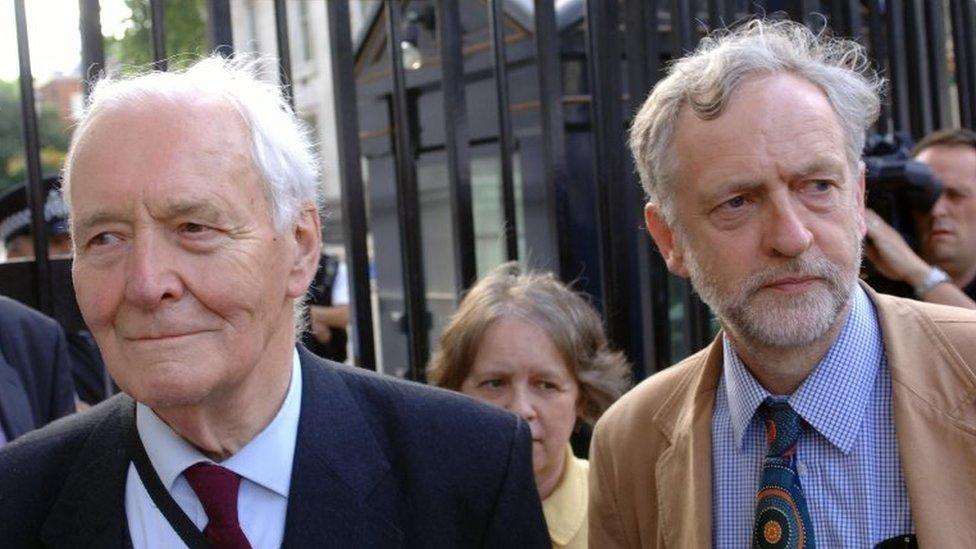
The late Tony Benn was a key influence on Corbyn's politics
He started a course in Trade Union Studies at North London Polytechnic but left after a series of arguments with his tutors over the curriculum.
"He probably knew more than them," Piers told The Sun.
A successful career as a trade union organiser followed, with the Amalgamated Engineering and Electrical Union (AEEU) and then the National Union of Public Employees (NUPE).
But his real passion was for Labour Party politics - and in 1974 he was elected to Haringey District Council, in North London.
In the same year he married fellow Labour councillor, Jane Chapman, a university lecturer.
Chapman says she married Corbyn for his "honesty" and "principles" but she soon grew weary of his intense focus on politics.
"Politics became our life. He was out most evenings because when we weren't at meetings he would go to the Labour headquarters, and do photocopying - in those days you couldn't print because there were no computers,' she told The Mail on Sunday, external.

What others say
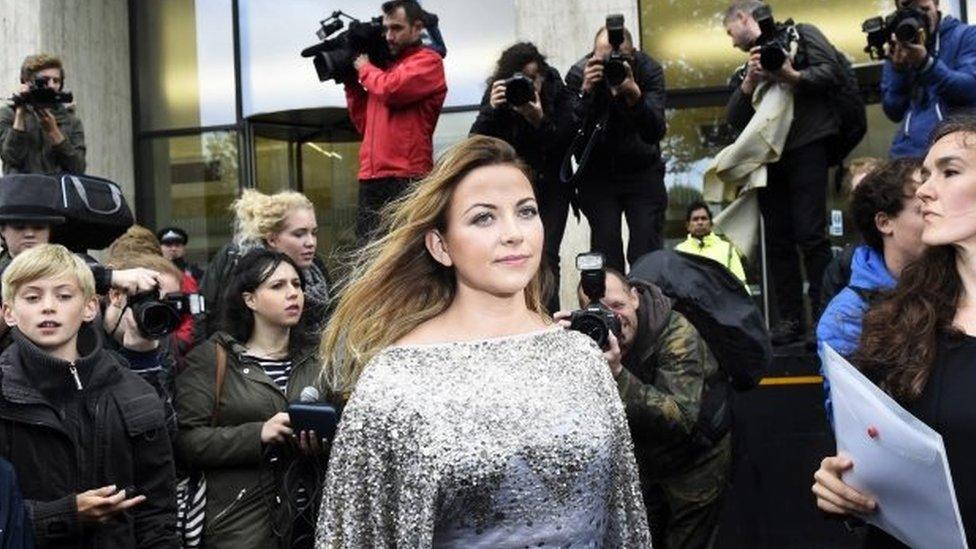
"Jeremy is a saintly figure of enormous personal integrity. He is a man who lives his life according to his beliefs," former Labour MP Chris Mullin, speaking to Panorama.
"If Jeremy Corbyn becomes leader it won't be a defeat like 1983 or 2015 at the next election. It will mean rout, possibly annihilation", former Labour leader and prime minister Tony Blair, external.
"The showbiz glitz of New Labour temporarily hid the hole where the heart of Labour was supposed to be. Now the 'Corbynites' (whoever expected to use that phrase?) are trying to hide that hole behind some old banners and a bloke with a beard," left-wing commentator Mick Hume, external.
"There is something inherently virtuous about him, and that is a quality that can rally the support of a lot of people, and most importantly, a lot of young people," singer and activist Charlotte Church, external (pictured).
"While most of his chums have all moderated their views, dumped their corduroy jackets and grey suits, shaved their beards and quietly cancelled their CND subscriptions, [he] has hardly changed a bit; he is the Fidel Castro of London N1," Telegraph journalist Robert Hardman.

They shared a love of animals, they had a tabby cat called Harold Wilson, and enjoyed camping holidays together in Europe on Corbyn's motorbike.
But fun was in short supply at home, recalls Chapman, who remains in touch with Corbyn and backed his leadership bid.
During their five years together he never once took her dinner, she told The Mail, preferring instead to "grab a can of beans and eat it straight from the can" to save time.
In 1987, Corbyn married Claudia Bracchita, a Chilean exile, with whom he had three sons. The youngest, Tommy, was born while Corbyn was lecturing NUPE members elsewhere in the same hospital. Twenty-five-year-old Seb has been helping out on his father's leadership campaign.
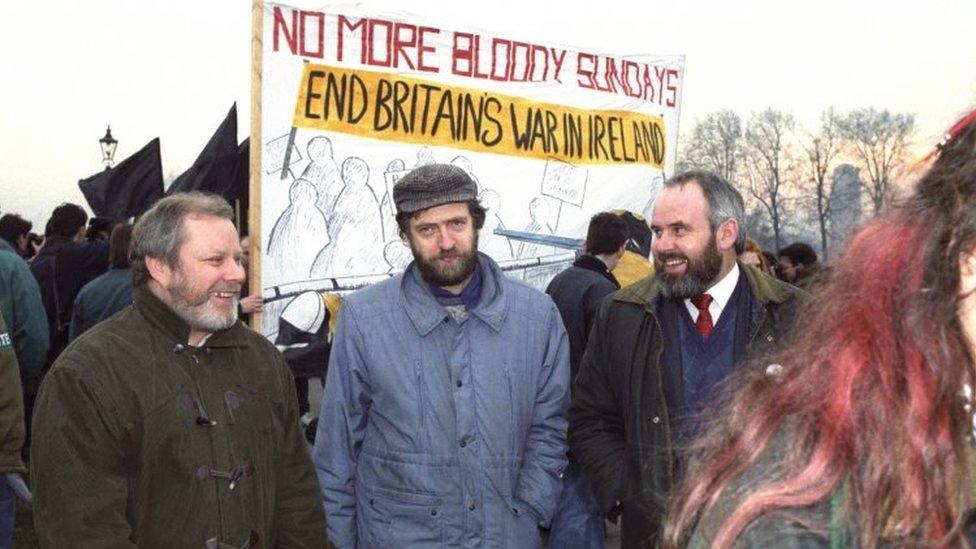
Corbyn is a long standing supporter of Irish Republicanism
The couple separated in 1999, but remained on good terms.
Corbyn got married for a third time last year, to his long term partner Laura Alvarez, a 46-year-old Mexican fair trade coffee importer.
In the bitter internal warfare that split Labour in the late 1970s and early eighties, Corbyn was firmly on the side of the quasi-Marxist hard left.
A Labour man to his fingertips - he was no Militant "entryist" trying to infiltrate the party by stealth - he nevertheless found common cause with former Trotskyists such as Ted Knight, and joined them in their battle to push the party to the left.
He became a disciple of Tony Benn, sharing his mentor's brand of democractic socialism, with its belief in worker controlled industries and state planning of the economy, as well as Benn's commitment to unilateral nuclear disarmament and a united Ireland.

Corbyn's causes
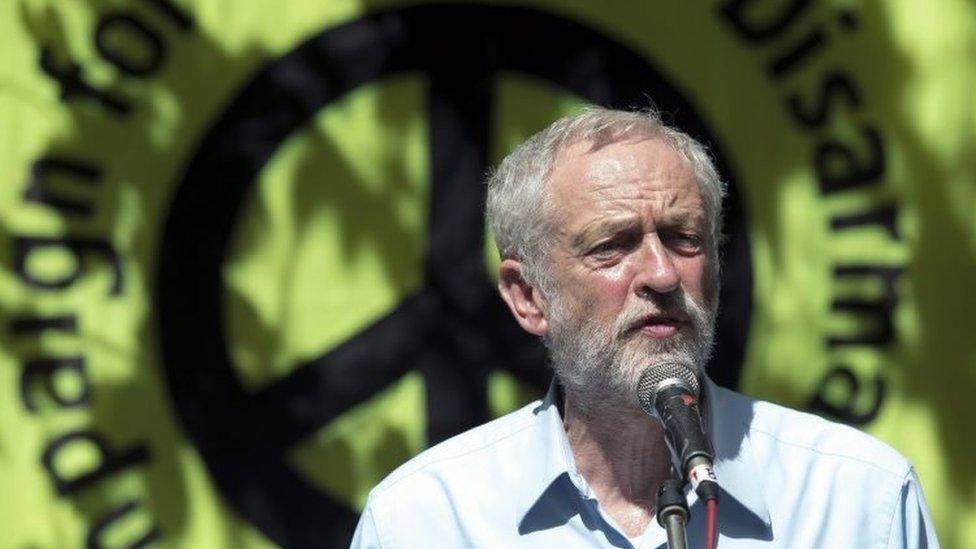
Here is just a small selection of the campaigns Jeremy Corbyn has been involved with over the past 50 years.
Nuclear disarmament: Joined CND as a schoolboy in 1966
Irish Republicanism: Organised Sinn Fein leader Gerry Adams' visit to the Commons in 1983. Once employed Irish Republican dissident Ronan Bennett as a member of staff at Westminster
Miners' strike: Invited striking miners into Commons gallery in 1985 who were expelled for shouting "Coal not Dole"
Anti-Apartheid: serving on the National Executive of the Anti-Apartheid Movement, and was arrested in 1984 for protesting outside South Africa House
Palestinian solidarity: A member of the Palestine Solidarity Campaign and campaigns regularly against the conflict in Gaza
Miscarriages of justice: Worked on on behalf of the Guildford Four and Birmingham Six, who were eventually found to be have been wrongly convicted of IRA bombings in England in the mid-1970s
Animal rights: Joined the League Against Cruel Sports at school, became a vegetarian at 20, after working on a pig farm
Iraq war: Chaired the Stop the War coalition
Gay rights: Spoke out in 1983 on a "No socialism without gay liberation" platform and continued to campaign for Lesbian, Gay, Bisexual and Transgender rights

Corbyn was never seen as a great orator like Benn, or a firebrand like miners' leader Arthur Scargill, but he worked tirelessly behind the scenes, his trousers stained with purple ink from the copying machines that produced the pamphlets and newspapers that were the lifeblood of the British Left in the pre-internet era.
He ran the London Labour Briefing newspaper, which helped propel Ken Livingstone to power on the Greater London Council.
He was elected to Parliament in 1983, to represent his home patch of Islington North, a seat he has held ever since and where he has increased his majority from 5,600 to 21,000, and as a back benchers was by most accounts a popular and hard-working MP.
The Bennite faction that Corbyn belonged to was already in retreat, following their leader's failure to capture the deputy leadership of the party in 1981.
'Modernisation'
After fighting and losing the 1983 election on arguably the most left-wing manifesto it had ever put before the British public, with its commitment to renationalising the utilities just privatised by the Thatcher government, pulling out of the EU, nuclear disarmament and the creation of a "national investment bank" to create jobs, Labour began the painful process of "modernisation" that led to the birth of New Labour.
And Corbyn would spend the next 32 years on the backbenches fighting a rearguard action against his party's abandonment of the radical policies and values contained in the '83 manifesto in the name of electability, under Neil Kinnock, John Smith and, most notably, Tony Blair.
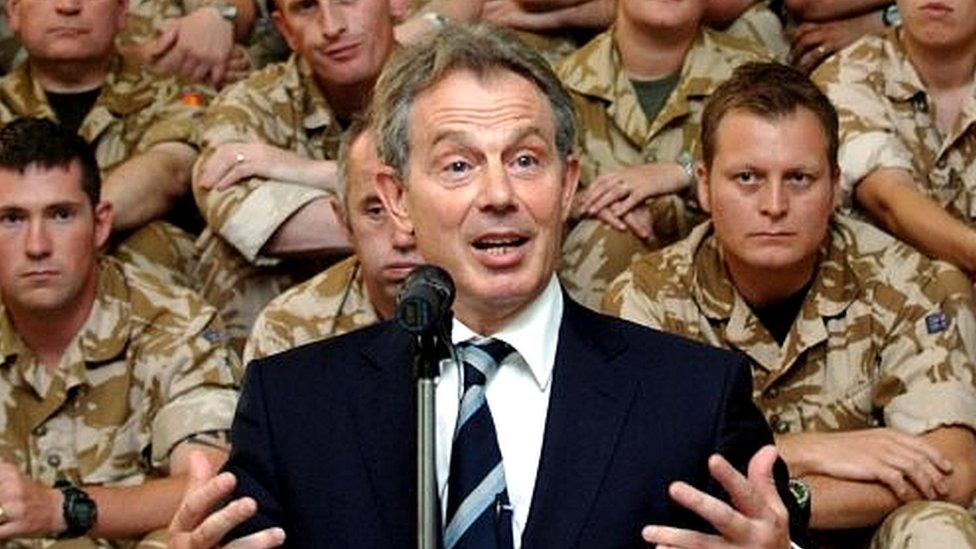
Corbyn has suggested Tony Blair should face a war crimes trial
Corbyn might have hailed from the same North London district as Blair and entered Parliament in the same year but that is where the similarity ended.
He abhorred Blair's embrace of free market economics and did his best to be a thorn in the younger man's side throughout his time in Downing Street, although Blair's large majorities ensured the damage was barely noticeable.
He would always vote with his conscience, rather than be dictated to by the party whips.
It earned him the accolade of being Labour's most rebellious MP, defying the party managers more than 500 times.
It also meant he and his allies became increasingly isolated, with their views and interventions ignored by the mainstream media and most of their colleagues on the Labour benches.
Blair's dire warnings that Labour would face "annihilation" if it elected Corbyn during the leadership contest were met by Corbyn with a suggestion that his predecessor as Labour leader should probably face trial for war crimes over his role in the Iraq war.
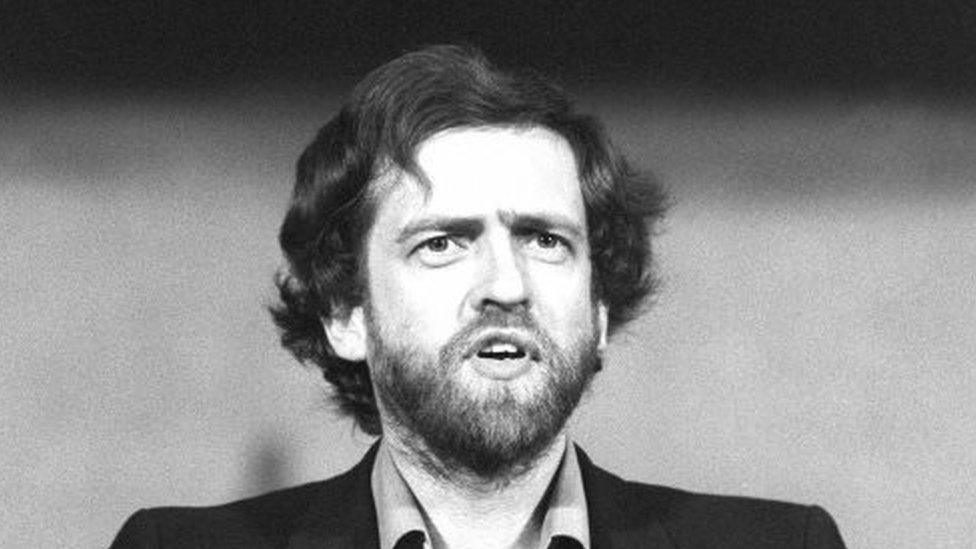
Corbyn has been a stalwart of the British left for more than 40 years
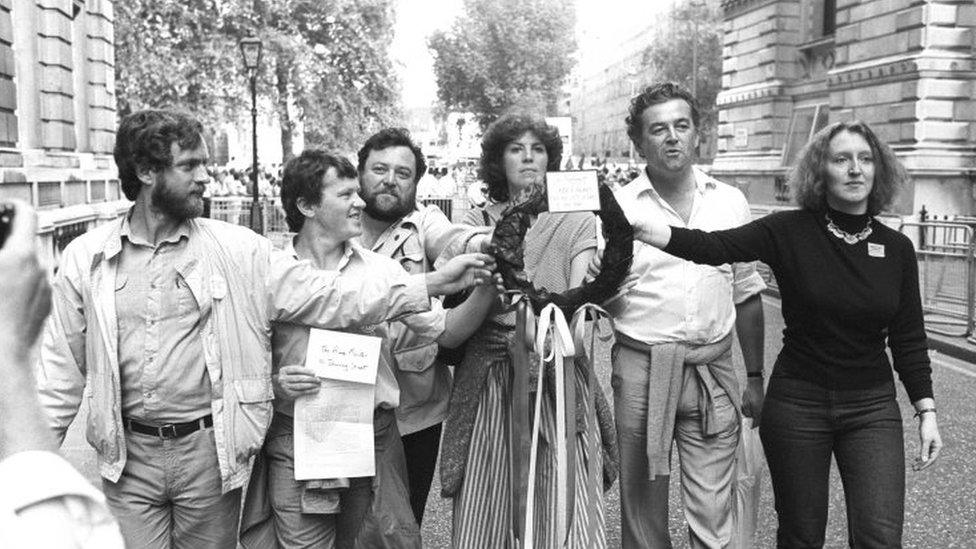
Campaigning for a united Ireland in 1984
Corbyn and his comrades - unlike their modernising colleagues they would use the term without irony - routinely attached themselves to any cause that felt like it would strike a blow against British and American "imperialism" or the Israeli state.
Internationalist in outlook, they would proclaim solidarity with socialist campaigns and governments in places like Cuba, Chile, Nicaragua, El Salvador and attack US policies that, in Corbyn's view, enslaved the Latin American world.
He incurred the wrath of the Labour leadership early on his career when he invited two former IRA prisoners to speak at Westminster, two weeks after the Brighton bomb that had nearly killed Margaret Thatcher and her cabinet.
Later on it would be his willingness to share platforms with representatives of Hamas and Hezbollah that would put him at the centre of controversy. When challenged, he insists he does not share their views but that peace will never be achieved without talking to all sides.
Rock star status
He may have been largely sidelined in the House of Commons, respected but too much of a known quantity to have an impact, but Corbyn's stature and profile outside Parliament continued to grow.
He chaired the Stop the War Coalition and became a leading figure in the anti-austerity movement, which began to attract large crowds of young activists eager for something to believe in and to take the fight to then Prime Minister David Cameron.
Still, no one gave Corbyn a prayer when he entered the contest to succeed Ed Miliband as Labour leader, with bookmakers offering a price of 200-1.
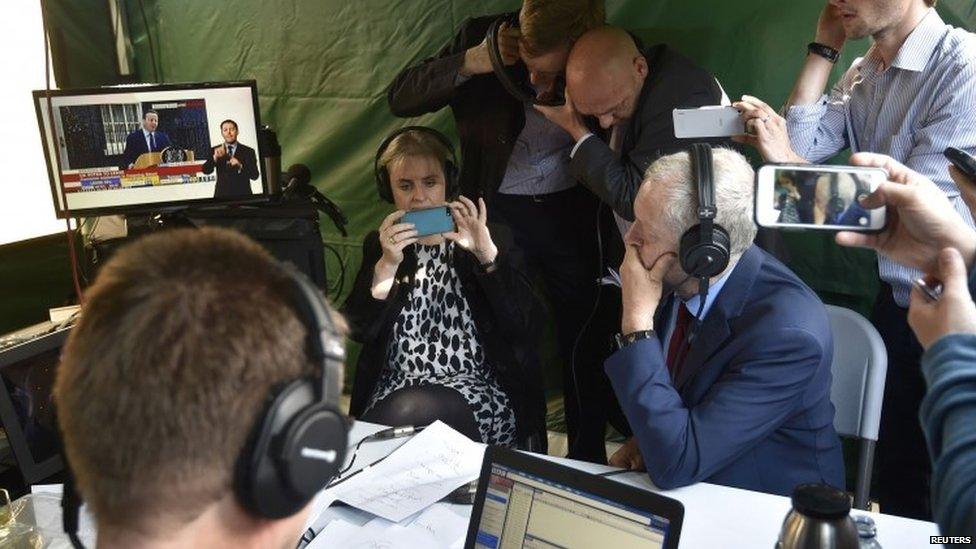
Mr Corbyn's relationship with the media has been a turbulent one
His elevation to rock star status, among the crowds who flocked to his leadership campaign meetings, must have been as much of a shock to Corbyn as it was to his opponents, but he never showed it.
He carried on, just as he always had, railing against inequality, talking about hope, promising to renationalise industries, tax the rich and scrap Trident, and wearing the same white, open-necked shirt with pens sticking out of the top pocket.
Only now people were listening.
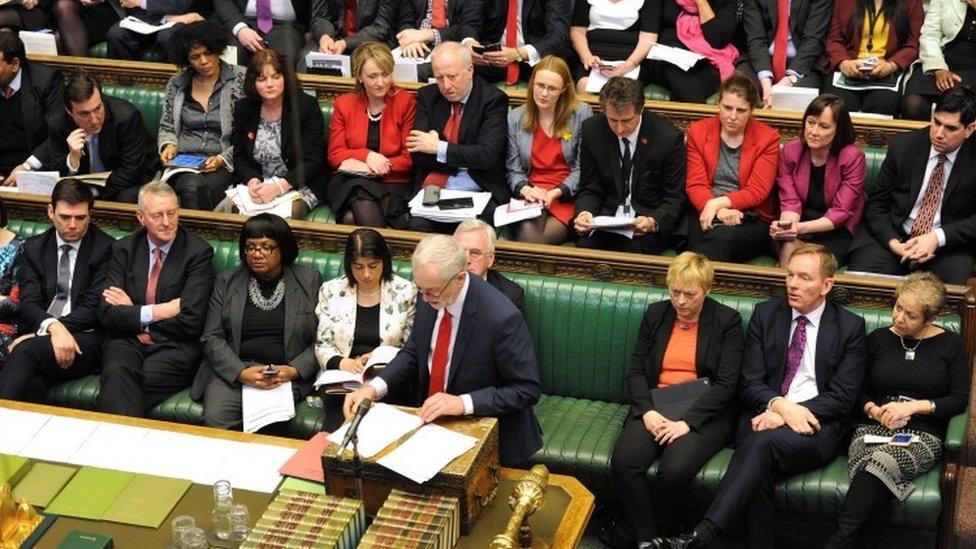
The Labour leader has sought to bring a new approach to Prime Minister's Questions
During that leadership campaign Jeremy Corbyn is understood to have rejected pleas from some supporters for him to stand aside, having made his point and injected new life into Labour's left, to leave the field clear for a younger candidate who might have more electoral appeal. He appeared determined to make a go of the leadership.
Many "moderate" shadow cabinet members returned to the backbenches rather than serve under him but he was able to put together a top team that reflected a broad range of opinion within the party.
He sought to bring a new approach to leadership, adopting a less confrontational and more conversational tone at Prime Minister's Questions and generally refraining from either sound bites or photo opportunities - to the exasperation of what his supporters call the "mainstream media" and the derision of some commentators.
Leadership challenge
The coalition behind Mr Corbyn held together for nine months, despite growing discontent among Labour MPs who had never wanted him as leader and could not accept either his style of leadership or his policies.
The EU referendum brought things to a head. Corbyn, who had been a Eurosceptic as a backbencher, was accused of mounting a half-hearted campaign to keep Britain in the EU and of not appearing to care too much that his side had lost.
Labour MPs, some of whom had been plotting to topple Corbyn at some point, saw this as the chance to make their move to try and force him to stand down, amid fears they would be wiped out at a snap election they expected to follow the referendum with him as leader.
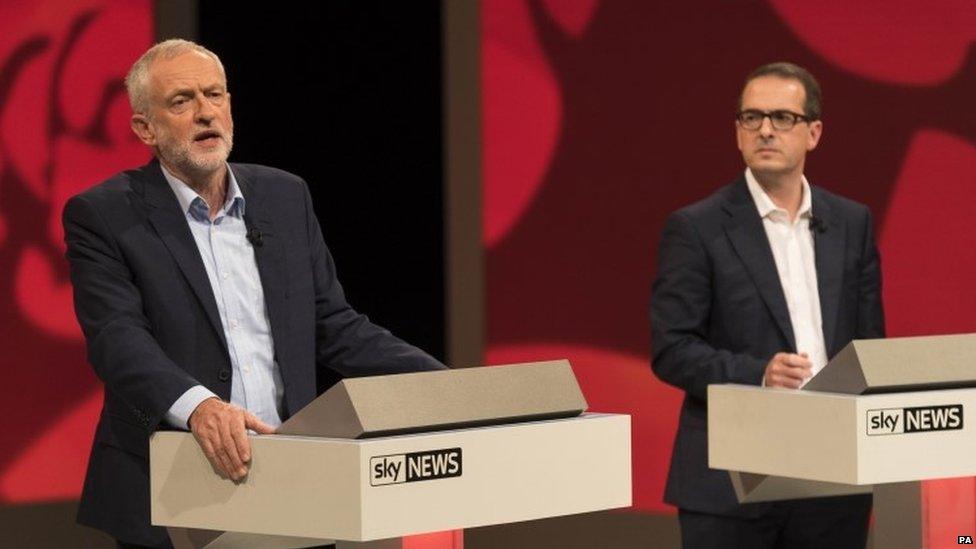
Owen Smith said his rival was unelectable but Mr Corbyn trounced him at the polls
He faced a mass walkout from the shadow cabinet and then a vote of no confidence, which he lost by 172 votes to 40, as Labour MPs - enemies and previously loyal shadow ministers alike - urged him to quit.
He refused to budge, pointing to the huge mandate he had received from Labour members and arguing that he had done better than many had expected in the electoral tests he had faced since becoming leader.
MPs selected Owen Smith, a former member of his shadow cabinet who claimed to share the same left wing values, to take him on in another leadership election.
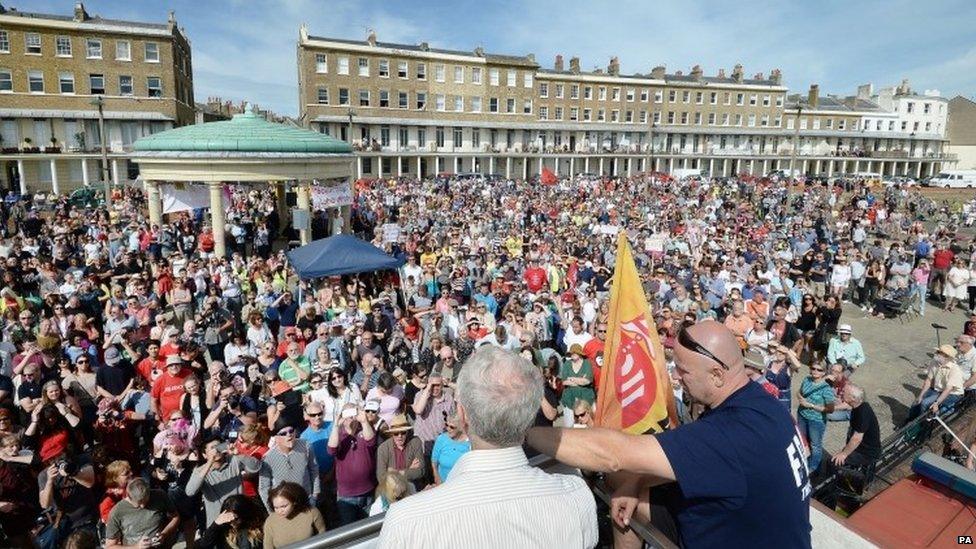
The Labour leader continued to draw in crowds that other politicians can only dream of
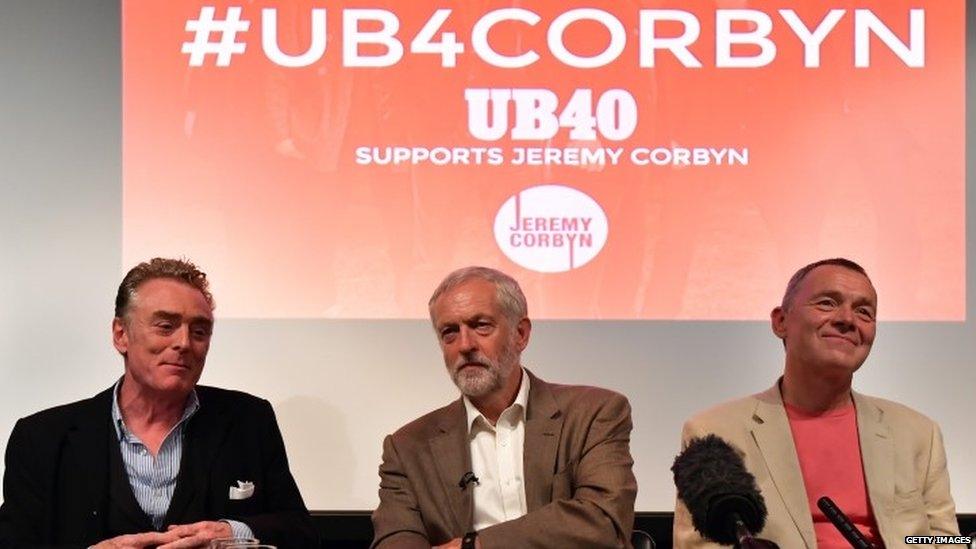
But critics joked that his endorsement by UB40 showed he was stuck in the 1980s
So Jeremy Corbyn, the reluctant leader who had to be persuaded to stand in 2015, now found himself fighting to hold on to a position he never expected to hold, this time as favourite rather than as outsider.
And, back on the campaign trail among his own supporters, he seemed to rather enjoy himself.
As was the case a year earlier, thousands of people flocked to hear Mr Corbyn speak at rallies across the country - 10,000 turned up at a single event in Liverpool - as he sought to tap directly into grassroots support for his message as a counterweight to the perceived hostility of the "mainstream media".
In an unconventional campaign which saw him endorsed by UB40 but vilified by JK Rowling, the only genuine moment of discomfort came during "traingate" - when his claims that a train was so "ram-packed" that he had to sit on the floor came into question after Virgin Trains released footage showing him passing empty seats.
Mr Corbyn's re-election has strengthened his position, with signs some of his critics are willing to serve under him again despite their differences.
But it remains to be seen whether his commitment to reach out to his opponents and focus squarely on winning the next election will act as springboard to a new phase of his leadership or prove only a temporary respite in what some have said is an existential battle for control of the party.